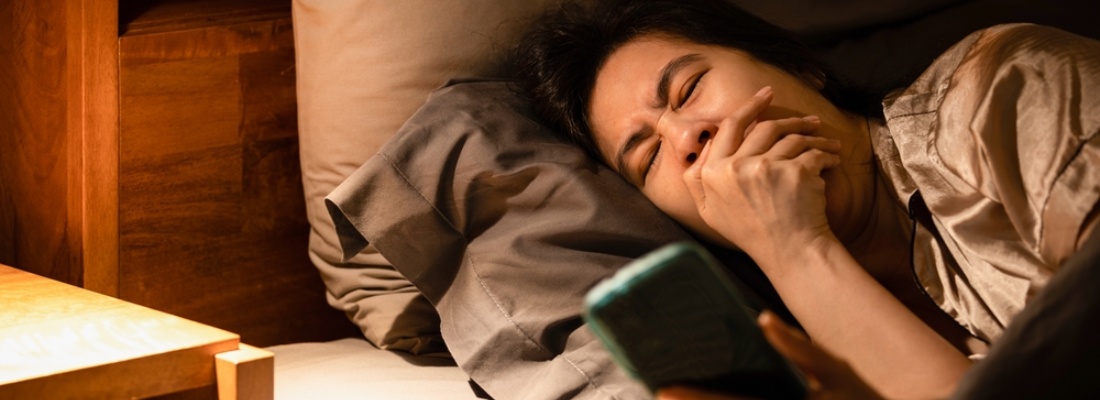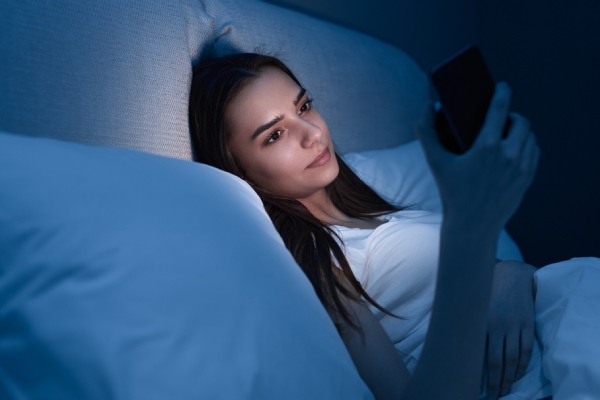
In today’s digital age, technology is integral to our lives. Whether we’re scrolling through social media, watching a late-night show, or catching up on work emails, screens play a crucial role. However, many of us fail to realize the impact of longer screen time and sleep, particularly before bedtime, on our overall health.
Recent studies show that from device usage, emitting light causes mental stimulation usage which disrupts the body’s natural sleep-wake cycle. However, this leads to difficulties falling asleep, staying asleep, and getting restful, restorative sleep. This blog will explore how screen time affects sleep, why it happens, and how to reduce its negative impact.
The Link Between Screen Time and Sleep
The relationship between screen time and sleep traces back to the effect of light exposure on our circadian rhythm. Our circadian rhythm controls melatonin production, the hormone that makes us sleepy at night. When it’s about light, especially blue light emitted by screens, suppresses melatonin production and delays sleep onset.
Moreover, a study by PubMed Central says that 90% of Americans were found using electronic devices within an hour before bed. This significantly disrupts their sleep patterns, often making it difficult to fall asleep and maintain sleep throughout the night. Furthermore, prolonged exposure to blue light from devices signals the brain that it’s still daytime, even though the body is preparing for sleep. As a result, melatonin production decreases, which delays sleep onset and diminishes sleep quality.
The Impact of Screen Time on Sleep
As the world becomes more digitally connected, it’s unsurprising that technology affects our sleep. Technology primarily disrupts sleep through the emitting light by our screens, mainly blue. But let’s break down the science behind this:
1. Blue Light and Melatonin Suppression
The blue light emitted from screens is a major drawback. Our bodies have a natural internal clock, the circadian rhythm, which regulates our sleep-wake cycle. One of the key hormones that plays a role in this rhythm is melatonin, a hormone responsible for making us feel sleepy when it’s time to rest.
Exposing yourself to blue light especially during the evening somehow suppresses melatonin production. This suppression delays the onset of sleep and reduces sleep quality. Essentially, to maintain screen time and sleep at bedtime, it is harder for your body to fall asleep.
Concerned About Your Sleep Problems?
Learn how our in-home sleep study can help diagnose sleep disorders in the comfort of your home.
2. Stimulating Content and Mental Alertness
Beyond the physical effects of blue light, the content we consume on screens also affects our ability to wind down. Whether checking emails, scrolling through social media, watching an exciting TV show, or playing video games. Moreover, the mental stimulation we experience from technology keeps our brains active long after putting our devices down.
The brain struggles to shift from a high-energy state to a comfortable state suitable for screen time and sleep. Thus, leading to longer periods of tossing and turning in bed. However, stimulating content, like news about current events, action-packed movies, or challenging video games, makes it even harder to transition into a restful state.
3. Sleep Disruption and Sleep Deprivation
Excessive screen time impacts the quality of your sleep and also reduces the total amount of sleep you get. This is especially true for people who use technology right up until bedtime. According to research, people who engage more with screens late into the night tend to experience more disruptions in their sleep cycle, reduces the overall sleep duration.
However, reduced sleep duration affects various aspects of health, such as mood regulation, cognitive function, sleep hygiene and even metabolism. A lack of sufficient screen time and sleep links to a higher risk of chronic conditions like heart disease, obesity, diabetes, and mental health disorders.
Practical Tips for Reducing Screen Time and Improving Sleep
While technology is a big part of modern life, there are ways to mitigate its adverse effects on sleep. Here are some tips for managing screen time to promote better sleep:
1. Establish a Screen-Free Bedtime Routine
To help signal to your brain that it’s time to wind down, try to use no phone before bed at least 30-60 minutes before bedtime. Use this time for relaxing activities, such as reading a physical book, taking a warm bath, practicing mindfulness etc. Moreover, simply dimming the lights and preparing your space for rest.
2. Use Night Mode or Blue Light Filters
If you must use your phone or computer in the evening, consider enabling “night mode” or blue light filter apps. These features reduce the amount of blue light from your device, which may help mitigate melatonin suppression. Many devices also allow you to adjust the screen’s color temperature based on the time of day.
3. Be Mindful of the Content You Consume
Try to avoid highly stimulating or stressful content and ensure no screen time before bed. Instead, opt for calming activities that help prepare your mind for rest. Gentle music, podcasts, or low-stress activities (like watching a light heart show or reading a book) helps your mind transition smoothly with screen time and sleep.
4. Set a Technology Curfew
Try setting a time each evening when you stop using your devices, especially the ones you use in your bedroom. This practice encourages healthier sleep habits and ensures you’re not engaging with technology too close to bedtime.
5. Limit Naps During the Day
While naps are great for recharging, long or late-afternoon naps interfere with your ability to fall asleep at night. Keeping naps short, 20 to 30 minutes and earlier in the day will help ensure you’re ready to sleep at your usual bedtime.
The Importance of Healthy Sleep Habits in the Digital Age
In our tech-driven world, maintaining healthy sleep disorder is more important than ever. While technology is a central part of our daily lives, it’s crucial to recognize how it impacts our screen time and sleep and take proactive steps to counteract these effects. Prioritizing quality sleep significantly improves mental and physical well-being, leading to better mood regulation, cognitive performance, and overall health. By creating a consistent sleep schedule, reducing screen exposure, and implementing other sleep-friendly habits, we can ensure we’re getting the rest our bodies and minds need, despite the digital distractions around us.
Final Thoughts
While technology brings countless benefits, it’s clear that screen time and sleep, especially in the evening, negatively affects sleep by disrupting the body’s natural circadian rhythm. However, the good news is that by being mindful of our screen habits and adjusting our routines, we can reduce these negative effects and improve our sleep quality with home sleep study.
Thus, it is essential for overall health to take control over your sleep habits and prioritize it just as much as we prioritize screen time. By understanding how our devices impact our rest and implementing a few simple strategies, we can strike a balance between our digital lives and our need for restful sleep.
Ready to Take Control of Your Sleep?
Take the first step toward better health—schedule your visit now with our expert team.

